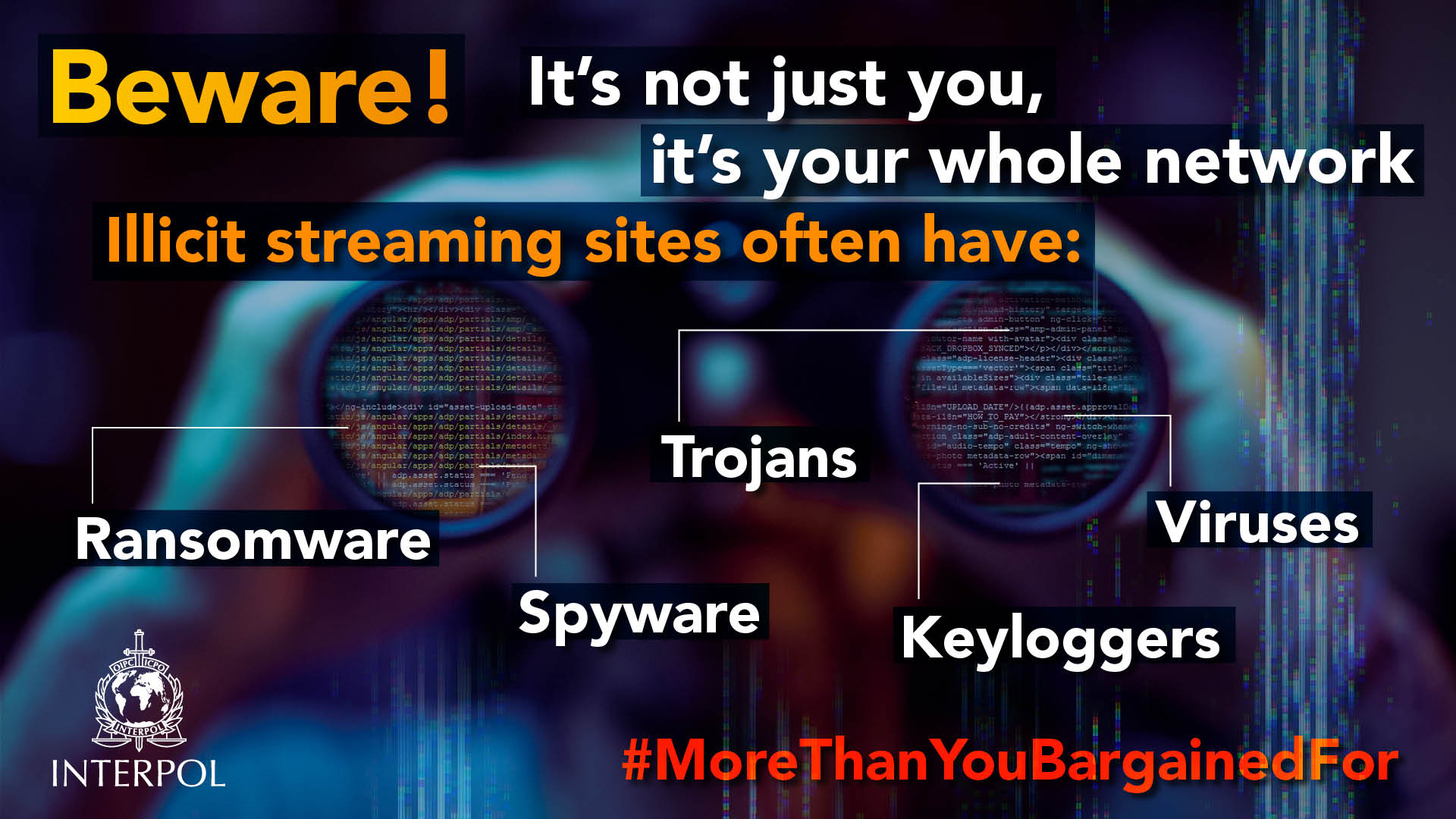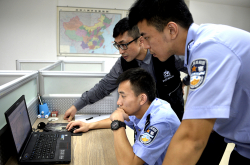Project I-SOP: INTERPOL Stop Online Piracy
Timeframe: 2021 to 2029
Budget: EUR 5.5 million
Donor: Republic of Korea, Ministry of Culture, Sport and Tourism
The situation
Online piracy affects many different types of digital content, such as software, music, TV, films and books. The illegal download and distribution of such content causes significant financial losses for the industries concerned, in turn affecting jobs and tax revenue.
It exposes consumers to related content that may be inappropriate or harmful, and can also be used to spread malware, Trojans and viruses which present clear security risks.
Criminals behind pirate sites can be part of organized crime groups. They can use the proceeds to fund other illegal activities, such as illegal online gambling, online sexual exploitation, drug trafficking, arms smuggling, and money laundering.
Organized Crime Groups involved in online piracy crimes frequently look like typical commercial companies, and are based on flexible structures, allowing them to adapt quickly to environmental changes.
Project summary
INTERPOL launched Project I-SOP in response to the sharp rise in digital piracy crimes prompted by the COVID-19 pandemic and lockdowns. Some countries reported an increase of more than 60 per cent in online piracy crimes in the 12 months from April 2020.
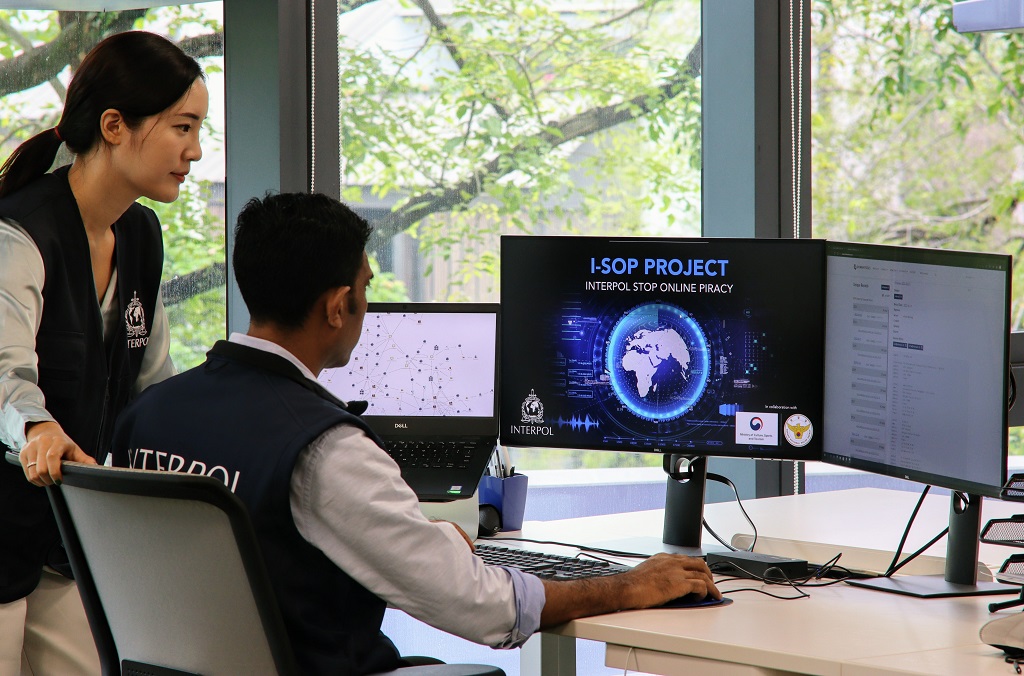
In collaboration with the Republic of Korea’s National Police and Ministry of Culture, Sports, and Tourism, INTERPOL has implemented a five-year project supporting enforcement actions, capacity building, research, and public awareness of online piracy and intellectual property (IP) crimes, such as trademark counterfeiting, copyright piracy and the online marketplaces used.

Building on the global efforts to combat online piracy and related crimes, the second phase of the INTERPOL-Stop Online Piracy (I-SOP) project was launched in 2025.
With funding of KRW 4.2 billion (EUR 2.8 million) from the Korean Ministry of Culture, Sports and Tourism (MCST) and support from the Korean National Police Agency (KNPA), the initiative will continue to dismantle illegal online distribution platforms, enhance international cooperation, and promote global awareness of copyright protection.
The first phase of the project led to significant successes, including the arrest of key operators behind major illegal platforms and the dismantling of the EVO Release Group.
MCST and KNPA aim to strengthen global copyright protection through its agreement with INTERPOL, reinforcing its leadership in K-content industries. Digital piracy is a highly profitable crime with serious economic and societal consequences. Digital piracy is connected to transnational crimes such as money laundering and fraud, underscoring the need for robust law enforcement measures. Its global nature requires strengthened cooperation between agencies to effectively combat online copyright violations.
Established during the first phase of I-SOP, the Advisory Group on Digital Piracy will continue to enhance the project's impact by identifying emerging threats, advancing innovative strategies, and facilitating effective intelligence sharing. Comprising experts from INTERPOL National Central Bureaus, specialized law enforcement units, and private sector organizations, the group plays a crucial role in strengthening global efforts against digital piracy.
In parallel, public awareness campaigns will remain a key component of I-SOP, educating consumers on the risks associated with digital piracy, including exposure to malware and cybersecurity threats.
Project activities
INTERPOL delivers capacity building and coordinates operational activities to tackle online piracy in partnership with enforcement agencies, international organizations, academia, and the private sector.
This is accomplished through INTERPOL’s secure police communications system, I-24/7, criminal databases, and the International IP Crime Investigators (IIPCIC) online training platform.
Project I-SOP draws on a range of expertise from specialized units at the INTERPOL General Secretariat, to coordinate operations, regional investigative and analytical case meetings, and other relevant events.
The range of activities includes:
- Increasing capacity in relevant law enforcement authorities to tackle digital piracy;
- Improving information exchange between public and private sectors;
- Collecting and analyzing intelligence;
- Identifying and taking down websites and servers that facilitate digital piracy;
- Dismantling criminal networks involved in digital piracy and targeting their assets.
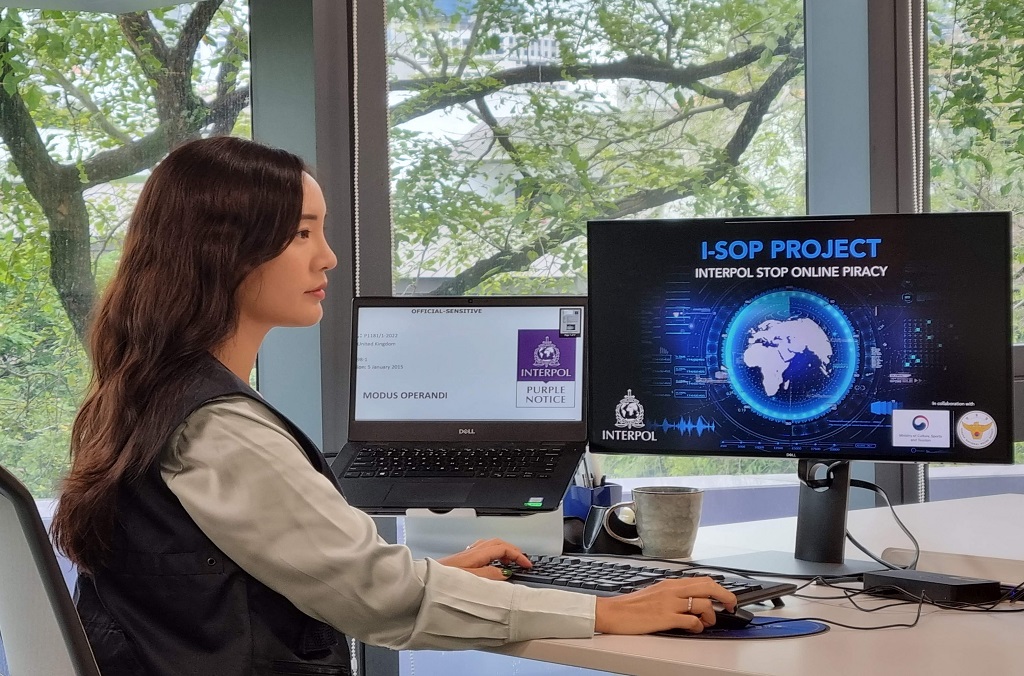
Project updates
November 2025
2nd INTERPOL Global Meeting on Digital Piracy (GMDP)
Held in collaboration with the Ministry of Culture, Sports and Tourism (MCST) and the Korea Copyright Protection Agency (KCOPA), discussions highlighted the central importance of strengthened partnerships in combating digital piracy. Speakers from law enforcement, academia, and major rights-holder organizations emphasized that the scale and sophistication of piracy networks require faster collaboration, better intelligence exchange and harmonized investigative practices.
During the event, MCST and KCOPA launched an awareness-raising video to emphasize the impact digital piracy has on the lives of creators and artists.
August 2024
Philippines, Korea, and INTERPOL cooperation shut down illegal IPTV service
Philippine authorities arrested the operator of an unlicensed IPTV service targeting Korean expatriates, following coordinated action supported by INTERPOL. The suspect had been sought by Korea under an INTERPOL Red Notice since October 2022 on piracy-related charges.
The arrest was the result of information sharing and operational coordination led by INTERPOL’s I-SOP team between the Korean National Police Agency and the Philippines National Bureau of Investigation. The joint operation involving NBI, BI, KNPA, MCST, and KCOPA supported a raid on the suspect’s residence in the Philippines, during which law enforcement seized PCs, mobile phones and illegal streaming devices.
May 2024
First Global Meeting on Digital Piracy
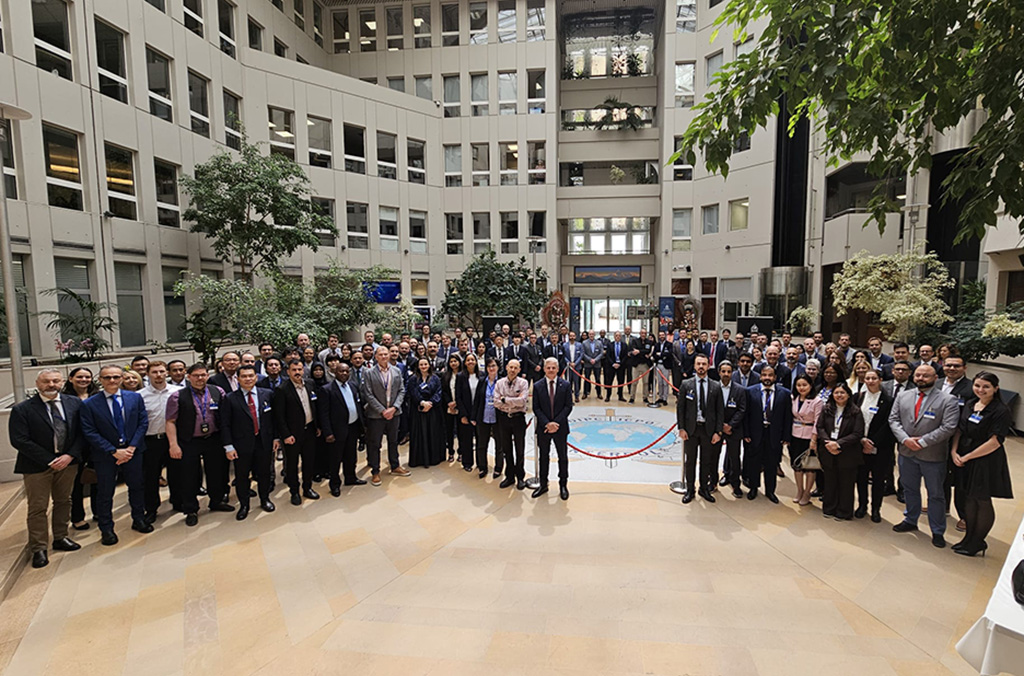
A key achievement of the I-SOP project was the success of the inaugural Global Meeting on Digital Piracy (GMDP), which established a network of experts for knowledge sharing and capacity building among law enforcement and stakeholders. The event raised awareness of digital piracy as a transnational threat and promoted global collaboration. It also highlighted resource gaps between sectors and emphasized the importance of private sector intelligence in law enforcement efforts. The event provided stakeholders with a deeper understanding of digital piracy investigations. Given its success, a Second Global Meeting on Digital Piracy will take place in Phase II, aiming to become an annual event to enhance collaboration and knowledge sharing.
December 2023
Indonesia, Korea, and INTERPOL cooperation shut down illegal IPTV service
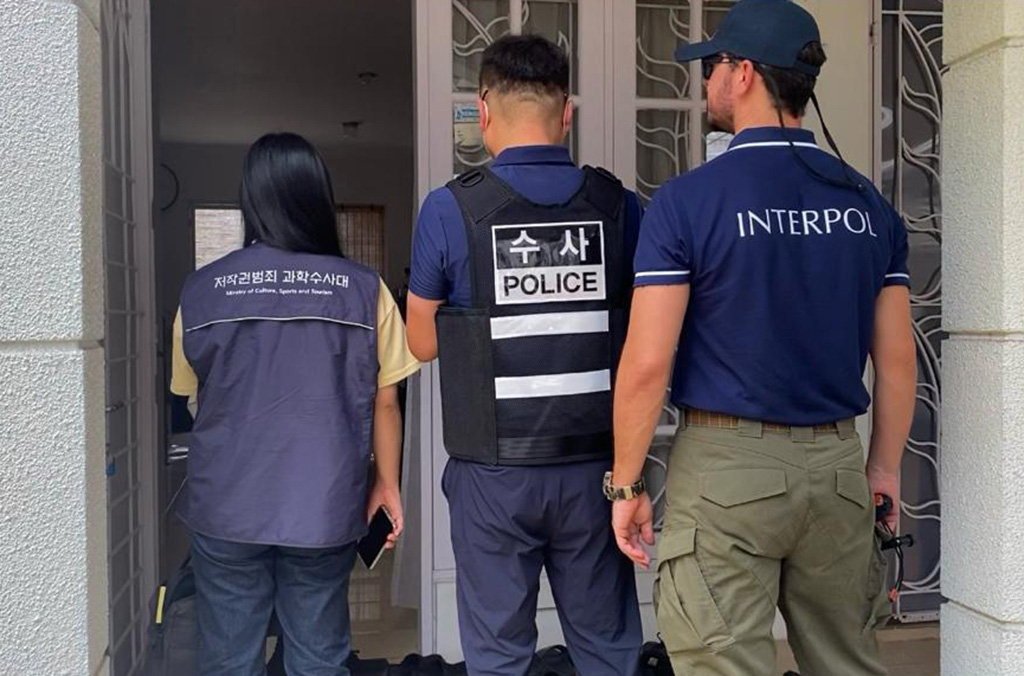
The suspects subscribed to 40 Korean cable TV service accounts, re-broadcasting content to Indonesia and offering video-on-demand (VOD) services through customized TV boxes, applications, and web browsers. The operation was first flagged by the copyright holder in May 2023, prompting an investigation led by INTERPOL’s Stop Online Piracy Project (I-SOP). Joint efforts by the Indonesian Directorate General of Intellectual Property (DGIP), the Korean Ministry of Culture, Sports and Tourism (MCST), and the Korean National Police Agency (KNPA) resulted in the arrest of three suspects.
April 2023
Operation EVO 1.2
Project I-SOP provided technical and analytical support to Portugal’s Polícia Judiciaria and Public Ministry in the takedown of EVO Release Group. The international criminal network is accused of illegally sharing copyrighted audio-visual products, causing losses of more than EUR one million.
The investigation, launched in 2022, identified the group’s servers, seized computer and mobile equipment, and resulted in the arrest of group’s leader. I-SOP deployed an officer to carry out analysis of the seized devices and provide a comprehensive report to authorities. Support will continue as the wider investigation progresses.

Project I-SOP was honored to receive an award for their crucial role in the EVO case at the IP Crime Conference in Oslo.
April 2023
#MoreThanYouBargainedFor
To mark World Intellectual Property Day, the I-SOP Project developed a series of infographics and messages for publication on social media. The posts, which ran on INTERPOL’s channels, raised awareness on the dangers of digital piracy, from legal considerations to associated cyberthreats.
For more information on how digital piracy might be #MoreThanYouBargainedFor, click here.
Advisory Group
INTERPOL’s Advisory Group on Digital Piracy provides strategic support to the I-SOP operational team. Made up of representatives from INTERPOL National Central Bureaus, specialized law enforcement units and experts from private sector organizations, it assists in the following ways:
- Advising on key existing and emerging threats;
- Identifying cases as well as strategic and tactical information;
- Developing and promoting innovative tactics and techniques;
- Facilitating the production of high quality INTERPOL notices.
Related documents


Related news
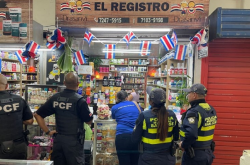
Global illicit medicines targeted by INTERPOL operation
31 October 2023





